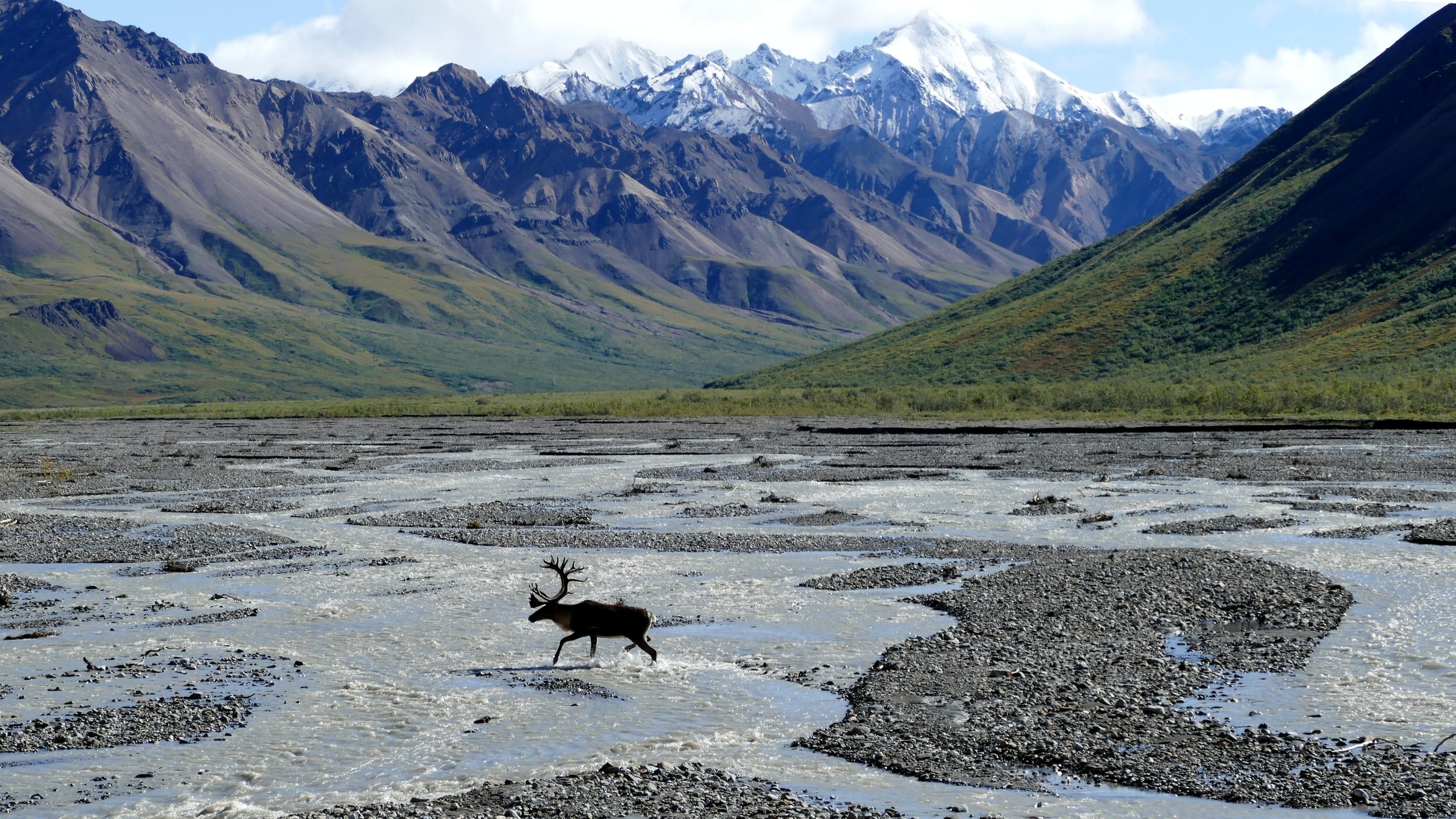Nothing Wasted
Preached August 15, 2021 at St. Marin’s-in-the-Field, Biddeford Pool & St. Philip’s-by-the-Sea, Fortunes Rocks
In one of my favorite non-fiction books, Caribou Rising, wilderness writer Rick Bass journeys to one of the sole remaining landscapes on Earth where the wild is entirely untrammeled—Alaska’s Arctic National Wildlife Refuge. He beautifully describes the spaces where great caribou herds gather, calve, and migrate, and where the ancient bond between animals and human hunters still informs the daily life of the Gwich’in people.
Just like us this morning, our Episcopal Gwich’in brothers and sisters gather for Eucharist today at Mission Church. They are worshiping in a 104 year old log cabin church building, breaking and blessing and sharing bread and celebrating God’s abundant care for God’s people. (Like us, they are fed with the bread of life.) They feast on the Word of God, as do we today. They pass an offering plate to share of their resources for the needs of the community and world, as do we.They pray, as we do today, for those who have died, those who grieve, people in need of God’s comfort and care. They sing songs of praise to God for the gift of life, for the blessings of friends and family and good work to do.
Once a year, this community of Gwich’in people hunts caribou to survive which is the heart of the book, Caribou Rising. The author wanted to witness what the Gwich’in stand to lose if legislation passed that would negatively impact the caribou herd. The book takes you into the hunt for caribou and into conversation with the Gwich-‘in people. These conversations uncover profound differences between Gwich’in culture and the ways in which I live. It exposes how disconnected I am from the natural world, how this industrialized and mechanized and computerized world has not only brought benefits, it has also cost us physical and spiritual disconnection with our own bodies, with ways of feeding ourselves and one another, with ways of being openly interdependent with others in the community for our daily survival.
Jesus teaches us to hunt for interconnectedness. God offers God’s very self to us in Jesus. God came to live among us in Jesus to give us more of God’s own self, to show us how interconnected we are not only with one another - also with God. Jesus offers us connection to the heart of God, using parables and healing and the breaking of bread with all sorts of people to move us from disconnected and violent ways of being into sacred and deeply good ways of being. We are on the hunt for this interconnected way of living with God because it reveals the true beauty of what it means to be human.
When the Gwich’in hunters return with the caribou, Rick Bass details how the caribou is processed by the community. Some begin to cook and smoke the meat, others process the hide. Children are learning from the expert hands of grandmothers and grandfathers who pass along ancient ways of preparing the sustenance for the community.
Many are involved,
all are fed,
and nothing is wasted.
The only food I’ve processed personally from start to finish is fresh-caught fish. My cousin and son are so much more adept at scaling and filleting that I just step back and get the pan and seasonings ready. Like many of you, most of my food is prepared for me before I buy it in a grocery store, I may grow a little food each summer, and buy more directly from the grower at a Farmer’s Market- however most of the time I have no idea where my food came from, other than the grocery store.
Our discourse on the bread of life in John’s Gospel speaks to people who understand implicitly that food is sacred. People like our Gwich’in brothers and sisters who hunt caribou, people who go out for lobsters each morning in Maine, farmers who anxiously watch the horizon for rain, shepherds who stay all night in the barn during lambing season.
Food is still sacred. It ensures the survival of your family and mine. It nourishes us to work and serve and care for one another. Food is the centerpiece of joyful celebrations. While food is still sacred to us, we may not be aware of that. In fact, we may, from time to time, throw out food we forgot to eat.
No mom or dad in the time of Jesus poured milk down the sink drain or tossed a bag of hoagie rolls into the trash, as I did yesterday because we forgot to eat them while they were fresh. In the ancient days of Jesus, and still in some communities who live closer to the land than many of us, food production, and the eating of food, was widely acknowledged as sacred.
Many involved, all fed, and nothing wasted.
When Jesus elaborates and then elaborates some more on how he is the living bread, the living bread that came down from heaven, bread that will feed us with eternal life, and how consuming this bread of life will create an abiding connection between him and those who share that bread - Jesus is drawing us into a celebration feast of being truly interconnected, where all the connections serve our lives, where all the connections are celebrated and give life throughout the community.
A celebration meal where yet again God has provided for our needs. A celebration meal where many are involved in processing and preparing and cooking. A celebration meal where all are fed until they are full to bursting with goodness. A celebration meal in which nothing is wasted- for why would we ever waste this goodness? If there is too much goodness for us to share, we offer it to others, never wasting one scrap of bread, one bite of meat.
I invite you to look at your food differently this week- to see it as pure gift from God. To perceive in fresh ways the connection food creates between your body and your wellbeing to the many hands that raised the ingredients, packaged them, drove them to market, cooked and delivered it onto your table. To understand in fresh ways that by eating this food, you are celebrating the ways your life connects with the lives of other people and their bodies, their well being- the ways your life connects with soil and sea. I invite you to waste none of it, none of the food, surely, -and also to waste none of the connection - waste none of the power food has to restore and heal us as a human family.
As you look at food in fresh ways and seek to waste none of it, I invite you to go one step further and waste nothing of Jesus, the Bread of Life. Savor every crumb and scrap of the goodness of God that comes before you. Share the goodness with those around you- waste none of it for this world is filled with people starving for God’s presence, God’s goodness. Share that goodness with others by your daily actions and the good vibes you transmit - sharing the good news that nourishes us with our daily bread- that God offers God’s very self to us in Jesus. That God is connected to us and we to one another. And where God is at work, we understand that many are involved, and all are fed, and nothing is wasted.


